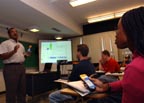November 09, 2005
Classroom technology helps engineering students
CARBONDALE, Ill. -- Think of a civil engineering class on foundation design as a game show.Jason D. Israel does.
"It's fun — kind of like Jeopardy!" said the 21-year-old senior from Springfield who is majoring in civil engineering at Southern Illinois University Carbondale.
What sets the class apart from those "monotone lectures and power-point lectures," said Winnila C. Walker, a senior from Chicago, is "the clicker," a remote control-like, computer-linked device that does everything from grading quizzes to taking roll.
"It makes the class a little more exciting," she added. "It's more interactive. It helps you pay attention."
The clicker, more properly known as an interactive wireless response pad, brings a new style of learning to the engineering college, said Professor Sanjeev Kumar, who teaches foundation design, a core class required of all undergraduates majoring in civil engineering.
With a receiver that plugs into his computer and software that analyzes the data coming in from the response pads, Kumar can take attendance, project what he calls "concept tests" onto a screen, record each student's answer to each question, produce graphs showing how many got the answers right and how many got them wrong (with a private indication to Kumar as to which was which), and grade the tests.
The system solves a problem common in many classes dealing with complicated subject matter.
"We ask in our classes, ‘Does anybody have any questions?' and when no one raises a hand, we believe that everything was clear, and we move on to the next topic, " Kumar said.
"We don't find out whether or not everything was clear until we grade a quiz, a homework assignment or an exam. By this time, it is generally too late to go back and re-explain the concepts of topics that were covered a week or two weeks ago.
"With this, I get instant feedback. If I can see that only 50 percent of the students understand the concept, I should go over it again. If 95 percent understand, then I should take time with individual students after class or in my office."
Kumar first saw this kind of teaching tool used by a friend of his to teach physics at a Memphis university. Intrigued, he decided to give it a try himself.
eInstructionCorp., a Denton, Texas, firm that makes active response systems for public schools, universities, colleges, corporations and military forces, supplied the hardware and software at a discount. Kumar's new dean, William P. Osborne, agreed to spring for the clickers for this first class so the students didn't have to buy them.
"That was a concern for me because they're around $30 each, "Kumar said. "I didn't know if I would like the system, if the students would like it or even if it would work."
Kumar spent considerable time preparing for this new way of teaching. He had to teach himself how to use the software, and he had to revamp his lesson plans to include the daily concept tests, which he also had to develop.
"That doesn't sound hard, but it takes time to come up with five good questions every day to test the student's understanding," he said.
"This is a design class that is challenging, and I'm teaching concepts, not number crunching. Testing the students' understanding of concepts is not that easy."
Early on, however, he saw the work paying off. Students normally score 70 percent or so on their first exam. This semester, they averaged 88 percent. He's also seen gains in attendance.
"I have hardly a student missing my class — attendance is nearly 100 percent," he said.
That may be because the system also eliminates the fear of the "dumb" question.
"It makes me feel that I am not the only one in class that doesn't understand the concepts," said Christopher A. Smith, a 22-year-old senior from the Bahamas.
Added Ryan J. Pearcy, a 21-year-old senior from Springfield, "I never dread coming in here to take a quiz."
Shaping high-quality undergraduate programs is among the goals of Southern at 150: Building Excellence Through Commitment, the long-range plan the University is following as it approaches its 150th anniversary in 2019.
Editors: Israel is the son of Springfield residents Douglas and Debra Israel (2201 Burgess Drive). Pearcy is the son of Springfield residents Junior and Debbie Pearcy (265 Circle Drive). Walker's mother, Winnila White, lives in Lansing.
(Caption: Clicker class — Sanjeev Kumar, a civil engineering professor at Southern Illinois University Carbondale, clarifies a concept during his class on foundation design. Students use handheld “clickers” to enter their answers to daily test questions on software run by the laptop on Kumar’s desk. The software then plots their responses on a bar graph projected on the screen, letting Kumar know instantly whether his students understood the concept.)

